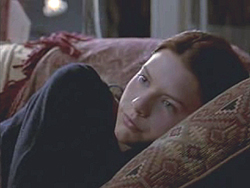My So-Called Memories
Published on January 30th, 2008 in: Issues, TV, We Miss The Nineties |In a time before youth/teen programming had nary a place—let alone the stranglehold it has today—in the television market, My So-Called Life quickly carved a niche as a grounded, thoughtful, realistic portrayal of teen life in suburban America. Unlike the Orange County teens of youth drama and reality shows today, the cast dealt with the typical problems of many teens (homophobia, relationships, drugs, alcohol, sex), but did so sincerely, not sensationally. These subjects were used as moral cornerstones of specific episodes (a standout being Episode 15, “So-Called Angels,” which was about Angela’s friend Rickie’s homelessness—guest starring Juliana Hatfield as an angel!), but they also permeated the running narrative, showing that these are issues teens constantly live and deal with, not merely have a daylong freak-out over.
These kids had curfews, rebelled against their parents by slamming doors, and overused the word “like” not as brainless filler, but as a seemingly self-conscious shield from thoughts that were getting too serious. Far be it for me to say that no teenager can realistically relate to overdosing in Tijuana on Spring Break, but scenes of dad brushing his teeth and mom moisturizing her hands before bed hit a little closer to home for me since everyone I grew up was from a quiet, small town.

Still from Episode 12: “Self-Esteem”
This YouTube clip demonstrates how teens
become introspective about even
the smallest of situations.
Maybe the show was too boring, too much like normal life—it was definitely much more realistic than today’s “reality” programming—so maybe that’s why it only lasted one season. In hindsight, this isn’t necessarily a bad thing, as it never had a chance to run itself into the ground. See: Gilmore Girls.
Why can My So-Called Life so successfully transport me back to being an enraptured teenager? Sure, one reason is nostalgia, but if the aforementioned angsty poetry is any indication, that isn’t necessarily enough. The show had an undeniable authenticity. This is especially obvious in the should-be-annoying dialogue which sometimes bordered on stoner philosophy, but which was ultimately age-appropriate and genuine, safe from the sickeningly self-aware speak of the Dawson’s Creek ilk, who would appear three years after My So-Called Life‘s demise.
The show always managed to find and highlight the significance in mundane adolescent existence (illustrated, it would seem, even by the show’s title). But it also portrayed the emotional complexity that the teenage mindset brings to these situations. Early teenage years aren’t typically wild; they’re spent at school or at home, daydreaming, trapped in your own self-exploratory thoughts, just like My So-Called Life showed us. I wish Angela Chase had narrated my adolescence.
Pages: 1 2
Time limit is exhausted. Please reload the CAPTCHA.